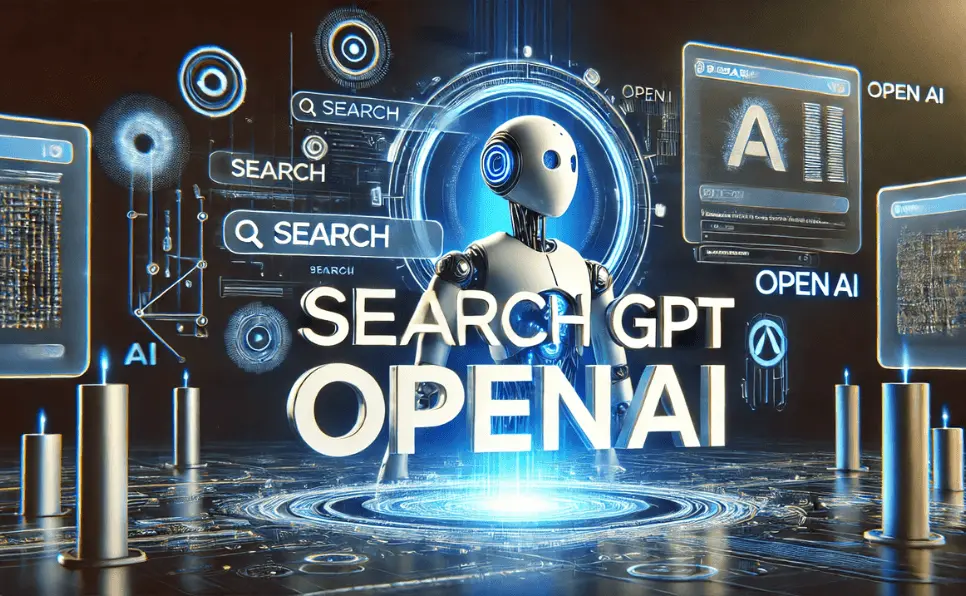Unveiling SearchGPT by OpenAI
What is SearchGPT?
Introduction to SearchGPT OpenAI has recently unveiled SearchGPT, an innovative search engine that aims to revolutionize the way we interact with information online. Unlike traditional search engines that rely heavily on keyword-based searches. SearchGPT employs conversational AI to understand and respond to user queries in a more natural and intuitive manner.
Key Features of SearchGPT SearchGPT boasts several groundbreaking features, including:
Conversational Search: SearchGPT allows users to ask questions in a natural, conversational manner. For instance, if you ask, “What are the best noise-canceling headphones in 2024?” SearchGPT will provide a summarized answer highlighting top contenders based on expert reviews and user feedback.
Real-Time Information: The search engine pulls real-time data from the web, ensuring that users receive the most current information available. This is particularly beneficial for queries related to recent events or emerging trends.
Enhanced User Interaction: Users can interact with SearchGPT through follow-up questions, making the search experience more engaging and tailored to individual needs. This conversational capability sets SearchGPT apart from traditional search engines.
The Evolution of Search Engines
From Traditional to AI-Powered Searches Search engines have evolved significantly from their early days of simple keyword matching. The introduction of AI has paved the way for more sophisticated and intuitive search experiences, with SearchGPT leading the charge.
How SearchGPT Fits into the Evolution SearchGPT represents the next step in this evolution, shifting the paradigm from keyword-based search to conversational search. This transition enhances user experience by providing more relevant and contextually accurate results.
How Does SearchGPT Work?
Conversational Search Explained SearchGPT utilizes advanced AI models to interpret and respond to user queries in a conversational manner. This approach allows users to refine their questions and receive more precise answers through follow-up interactions.
AI Models and Real-Time Data Integration The backbone of SearchGPT is its AI models, which are trained to understand the intent behind user queries. These models are integrated with real-time data from the web, ensuring that the information provided is both accurate and current.
Key Differences Between SearchGPT and Google
Conversational Interface vs. Keyword-Based Search While Google relies on keyword-based search, SearchGPT employs a conversational interface, enabling users to ask questions in natural language and receive direct answers.
Direct Answers vs. List of Links SearchGPT provides direct answers with citations, making it easier for users to find the information they need without sifting through multiple links. In contrast, Google presents a list of links, requiring users to navigate through various sources.
AI-Powered Understanding vs. Keyword Matching SearchGPT’s AI-powered understanding allows it to grasp the context and nuances of user queries, providing more relevant results. Google’s primary mechanism is keyword matching, which can sometimes lead to less accurate results for complex queries.
SearchGPT vs. ChatGPT
Primary Purpose and Function While both SearchGPT and ChatGPT are developed by OpenAI, they serve different purposes. SearchGPT is designed for search, providing direct answers and sources from the web, whereas ChatGPT is focused on conversational AI, generating text responses.
Differences in Information Sources SearchGPT relies on real-time information from the web, ensuring up-to-date answers. ChatGPT, on the other hand, is based on its training data, which may not always be current.
Response Format and Use Cases SearchGPT prioritizes concise answers with citations, ideal for fact-finding and research. ChatGPT offers more flexible responses, suitable for creative writing, brainstorming, and other open-ended tasks.
SearchGPT vs. AI Overviews
Similarities and Differences Both SearchGPT and AI Overviews use AI to summarize information from multiple sources. However, SearchGPT offers more detailed answers and transparent source attribution, while AI Overviews focus on quick summaries.
Detailed Comparisons SearchGPT excels in providing comprehensive answers with clear citations, making it suitable for in-depth research. AI Overviews, on the other hand, are better for quick information retrieval and introductory insights.
Impact of SearchGPT on the Search Engine Market
Competition with Google and Other Search Engines The launch of SearchGPT positions. OpenAI as a formidable competitor to Google, Bing, and emerging AI-powered search engines like Perplexity. This competition is likely to drive innovation and improvements in the search engine market.
Potential Market Shifts As more users adopt SearchGPT, we may see a shift in market dynamics. With traditional search engines adapting to incorporate more AI-driven features to stay relevant.
Benefits of Using SearchGPT
Enhanced User Experience SearchGPT’s conversational interface and direct answers enhance the user experience by providing faster and more accurate results.
Accurate and Up-to-Date Information By integrating real-time data from the web, SearchGPT ensures that users receive the most current and accurate information available.
Transparency and Source Attribution SearchGPT’s commitment to transparency is evident in its clear citations and links to source material, allowing users to verify the information they receive.
Challenges and Ethical Considerations
Bias and Misinformation Concerns As with any AI-powered tool, there are concerns about potential biases in SearchGPT’s responses and the spread of misinformation. Ensuring accuracy and fairness in AI-generated content is crucial.
Privacy Issues The integration of real-time data raises privacy concerns, particularly regarding the tracking and analysis of user behavior. Addressing these issues is essential for maintaining user trust.
Impact on Content Creators The shift towards direct answers may reduce traffic to individual websites, impacting content creators and publishers. Finding a balance between providing concise answers and supporting content creators is a key challenge.
| Feature | SearchGPT | |
| Search Method | Conversational | Keyword-Based |
| Answer Format | Direct answers with citations | List of links |
| User Interaction | Interactive, allows follow-up questions | Isolated queries |
| Information Source | Real-time web data | Indexed web pages |
| Transparency | Clear citations and links to sources | Links without direct context |
The Future of SearchGPT
Ongoing Developments and Updates OpenAI continues to refine and improve SearchGPT, with plans to integrate its features into ChatGPT and other platforms. Ongoing updates and user feedback will shape the future of this AI-powered search engine.
Integration with ChatGPT Combining the search capabilities of SearchGPT with the conversational abilities of ChatGPT could lead to a powerful and versatile AI tool, offering a seamless search and interaction experience.
Prospects of SearchGPT As AI technology advances, SearchGPT has the potential to become a major player in the search engine market, challenging traditional models and setting new standards for user interaction.
FAQs About SearchGPT
What is SearchGPT? SearchGPT is an AI-powered search engine developed by OpenAI that uses conversational AI to provide direct answers to user queries with clear citations.
How does SearchGPT differ from Google? Unlike Google’s keyword-based search, SearchGPT uses a conversational interface and provides direct answers with citations, enhancing the user experience with more relevant and contextually accurate results.
What makes SearchGPT unique compared to other AI search engines? SearchGPT’s combination of conversational search, real-time data integration, and transparent source attribution sets it apart from other AI search engines like AI Overviews and Perplexity.
When will SearchGPT be publicly available? Currently, SearchGPT is in a limited prototype phase, with wider availability expected as OpenAI continues testing and refining the product.



